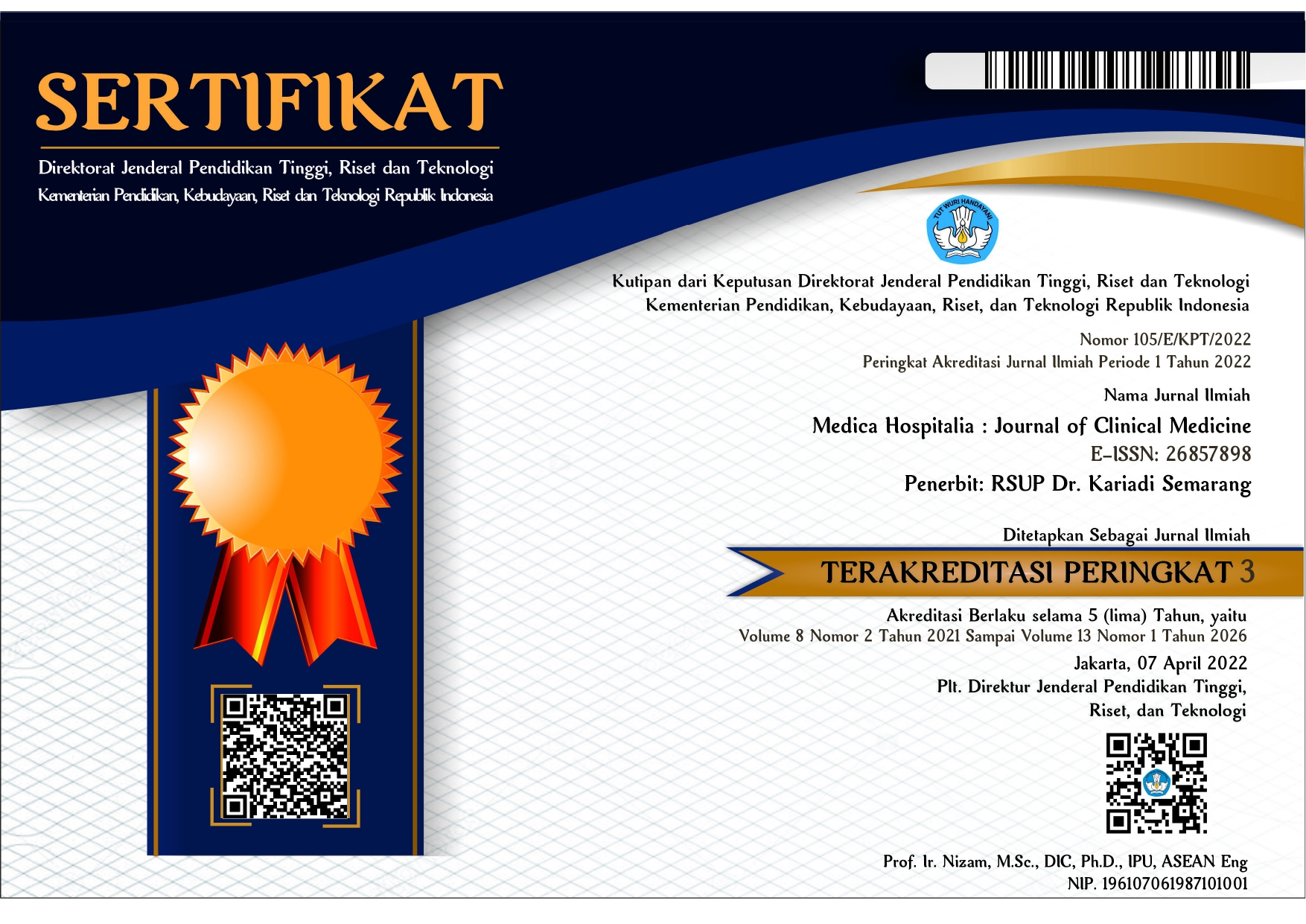Prediction Score of Antegrade Chronic Total Occlusion Percutaneous Coronary Intervention Success in Dr. Kariadi Central General Hospital Semarang
DOI:
https://doi.org/10.36408/mhjcm.v7i2.514Keywords:
chronic total occlusion, percutaneous coronary intervention, success, prediction scoreAbstract
Background:
Lesion characteristics of chronic total occlusion (CTO) are predictors of percutaneous coronary intervention (PCI) success. A prediction score consist of these predictors can help CTO-PCI operators. Various prediction score had been established but none had been established in Indonesian population.
Methods:
This observational cohort study was performed in patients underwent native vessel CTO-PCI in Dr.Kariadi Hospital during 2018. Target vessels, ostial lesion, blunt stump, calcification, long lesion, bending, side branch, bridging collateral, and retrograde collateral were angiographic variables proposed to be predictors of CTO-PCI success. All of the variables were quantitatively assessed by two observers. Bivariate and multivariate analysis used to identify independent predictors of CTO-PCI success and to establish a scoring model.
Results:
A total 200 patients underwent CTO-PCI procedures were included to this study. All of the procedures used antegrade approach. The prediction score established as follows: bending (1 point), calcification (2 point), blunt stump (3 point), long lesion (1 point), and poor retrograde collateral filling (2 point). Total score ranged from 0 to 9 with decreased probability of success from 92.3% to 0.5%. Score value ? 3 categorized as difficult lesion with higher risk to failure compared to score value <3 (OR 15.4; p<0.001). The score model had good calibration and discrimination in predict CTO-PCI success (AUC 0.88; p<0.001).
Conclusion:
Bending, calcification, blunt stump, long lesion, and poor retrograde collateral were predictors of CTO-PCI success. The score consist of these variables could predict antegrade CTO-PCI success.
Keywords: chronic total occlusion; percutaneous coronary intervention; success; prediction score.
Downloads
References
2. Tomasello SD, Boukhris M, Giubilato S, Marza F, Garbo R, Contegiacomo G, et al. Management strategies in patients affected by chronic total occlusions: Results from the Italian Registry of Chronic Total Occlusions. Eur Heart J 2015; 36: 3189–3198a.
3. Brilakis ES, Banerjee S, Karmpaliotis D. Procedural Outcomes of Chronic Total Occlusion Percutaneous Coronary Intervention. J Am Coll Cardiol 2015; 8: 245–53.
4. Werner GS, Martin-Yuste V, Hildick-Smith D, Boudou N, Sianos G, Gelev V, et al. A randomized multicentre trial to compare revascularization with optimal medical therapy for the treatment of chronic total coronary occlusions. Eur Heart J 2018; 39: 2484–2493.
5. Alessandrino G, Chevalier B, Lefèvre T, Sanguineti F, Garot P, Unterseeh T, et al. A Clinical and Angiographic Scoring System to Predict the Probability of Successful First-Attempt Percutaneous Coronary Intervention in Patients With Total Chronic Coronary Occlusion. JACC Cardiovasc Interv 2015; 8: 1540–1548.
6. Morino Y, Abe M, Morimoto T, Kimura T, Hayashi Y, Muramatsu T, et al. Predicting successful guidewire crossing through chronic total occlusion of native coronary lesions within 30 minutes. JACC Cardiovasc Interv 2011; 4: 213–221.
7. Christopoulos G, Kandzari DE, Yeh RW, Jaffer FA, Karmpaliotis D, Wyman MR, et al. Development and Validation of a Novel Scoring System for Predicting Technical Success of Chronic Total Occlusion Percutaneous Coronary Interventions the PROGRESS CTO (Prospective Global Registry for the Study of Chronic Total Occlusion Intervention) Score. JACC Cardiovasc Interv 2016; 9: 1–9.
8. Patel VG, Brayton KM, Tamayo A, Mogabgab O, Michael TT, Lo N, et al. Angiographic Success and Procedural Complications in Patients Undergoing Percutaneous Coronary Chronic Total Occlusion Interventions. JACC Cardiovasc Interv 2013; 6: 128–136.
9. Tajti P, Burke MN, Karmpaliotis D, Alaswad K, Werner GS, Azzalini L, et al. Update in the Percutaneous Management of Coronary Chronic Total Occlusions. JACC Cardiovasc Interv 2018; 11: 615–625.
10. Nombela-Franco L, Urena M, Jerez-Valero M, Nguyen CM, Ribeiro HB, Bataille Y, et al. Validation of the J-chronic total occlusion score for chronic total occlusion percutaneous coronary intervention in an independent contemporary cohort. Circ Cardiovasc Interv 2013; 6: 635–643.
11. Karatasakis A, Danek BA, Karmpaliotis D, Alaswad K, Jaffer FA, Yeh RW, et al. Comparison of various scores for predicting success of chronic total occlusion percutaneous coronary intervention. Int J Cardiol 2016; 224: 50–56.
12. Finn M, Kalra S, Kirtane AJ, Ali Z, Tang Y, Sapontis J, et al. JCTO and PROGRESS CTO scores performance in predicting technical and procedural success after CTO PCI: An analysis of the OPEN CTO multicenter registry. J Am Coll Cardiol 2017; 70: B207–B208.
13. Di Mario C, Werner GS, Sianos G, Galassi AR, Büttner J, Dudek D, et al. European perspective in the recanalisation of Chronic Total Occlusions (CTO): consensus document from the EuroCTO Club. EuroIntervention J Eur Collab with Work Gr Interv Cardiol Eur Soc Cardiol 2007; 3: 30–43.
14. Jin C De, Kim MH, Kim SJ, Lee KM, Kim TH, Cho YR, et al. Predicting successful recanalization in patients with native coronary chronic total occlusion: The busan CTO score. Cardiol 2017; 137: 83–91.
15. Khattab A, Meier B. Chronic Total Occlusion. In: Textbook of Intereventional Cardiology sixth edition. Philadelphia: Elsevier, 2012, p. 312.
16. Tran P, Phan H, Shah SR, Latif F, Nguyen T. Applied Pathology for Interventions of Coronary Chronic Total Occlusion. Curr Cardiol Rev 2015; 11: 273–276.
17. Karacsonyi J, Karmpaliotis D, Alaswad K, Jaffer FA, Yeh RW, Patel M, et al. Impact of Calcium on Chronic Total Occlusion Percutaneous Coronary Interventions. Am J Cardiol 2017; 120: 40–46.
18. Onuma Y, Tanimoto S, Ruygrok P, Neuzner J, Piek JJ, Seth A, et al. Efficacy of everolimus eluting stent implantation in patients with calcified coronary culprit lesions: Two-year angiographic and three-year clinical results from the SPIRIT II study. Catheter Cardiovasc Interv 2010; 76: 634–642.
19. Dash D. Coronary chronic total occlusion intervention: A pathophysiological perspective. Indian Heart J 2018; 70: 548–555.
20. Ahn J, Rha SW, Choi BG, Choi SY, Byun JK, Mashaly A. Impact of Chronic Total Occlusion Lesion Length on six-month angiographic and 2-year clinical outcomes. PLoS One 2018; 13: 1–11.
21. Galassi AR, Boukhris M, Azzarelli S, Castaing M, Marzà F, Tomasello SD. Percutaneous Coronary Revascularization for Chronic Total Occlusions A Novel Predictive Score of Technical Failure Using Advanced Technologies. JACC Cardiovasc Interv 2016; 9: 911–922.
22. Maeremans J, Spratt JC, Knaapen P, Walsh S, Agostoni P, Wilson W, et al. Towards a contemporary, comprehensive scoring system for determining technical outcomes of hybrid percutaneous chronic total occlusion treatment: The RECHARGE score. Catheter Cardiovasc Interv 2018; 91: 192–202.
23. Hasegawa T, Godino C, Basavarajaiah S, Takagi K, Rezq A, Latib A, et al. Differences in the clinical and angiographic characteristics of chronic total occlusion lesions in the three major coronary arteries. J Interv Cardiol 2014; 27: 44–49.
24. Michael TT, Karmpaliotis D, Brilakis ES, Fuh E, Patel VG, Mogabgab O, et al. Procedural outcomes of revascularization of chronic total occlusion of native coronary arteries (from a multicenter United States registry). Am J Cardiol 2013; 112: 488–492.
Additional Files
Published
How to Cite
Issue
Section
Citation Check
License
Copyright (c) 2020 Medica Hospitalia : Journal of Clinical Medicine

This work is licensed under a Creative Commons Attribution-ShareAlike 4.0 International License.
Copyrights Notice
Copyrights:
Researchers publishing manuscrips at Medica Hospitalis: Journal of Clinical Medicine agree with regulations as follow:
Copyrights of each article belong to researchers, and it is likewise the patent rights
Researchers admit that Medica Hospitalia: Journal of Clinical Medicine has the right of first publication
Researchers may submit manuscripts separately, manage non exclusive distribution of published manuscripts into other versions (such as: being sent to researchers’ institutional repository, publication in the books, etc), admitting that manuscripts have been firstly published at Medica Hospitalia: Journal of Clinical Medicine
License:
Medica Hospitalia: Journal of Clinical Medicine is disseminated based on provisions of Creative Common Attribution-Share Alike 4.0 Internasional It allows individuals to duplicate and disseminate manuscripts in any formats, to alter, compose and make derivatives of manuscripts for any purpose. You are not allowed to use manuscripts for commercial purposes. You should properly acknowledge, reference links, and state that alterations have been made. You can do so in proper ways, but it does not hint that the licensors support you or your usage.
























